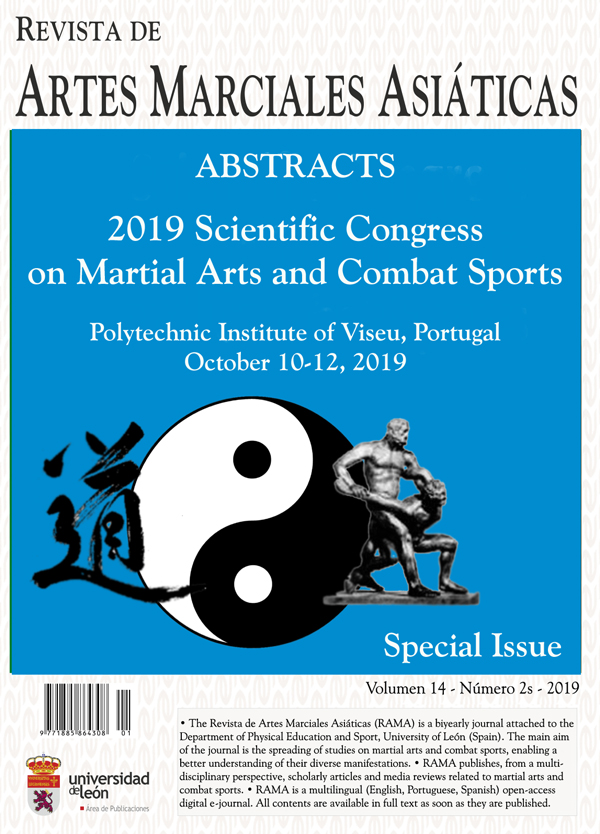ITF Taekwon-Do pedagogy in North Korea: A case study
DOI:
https://doi.org/10.18002/rama.v14i2s.6017Palavras-chave:
Martial arts, combat sports, taekwondo, musul, muyae, mudo, International Taekwon-Do Federation, behavioral-rational curriculumResumo
Background. Despite the style of Taekwon-Do taught by the International Taekwon-Do Federation (ITF) being founded in the Republic of Korea (ROK; South Korea), it is known predominately as “North Korean Taekwon-Do.” Problem and Aim. Taekwon-Do was introduced to the People’s Democratic Republic of Korea (DPRK; North Korea) in 1980, but since then no studies have reported how it is practiced in that country due to the DPRK government’s restricting access to its populace. This research aims to begin establishing if there are differences in pedagogical purpose and praxis in DPRK Taekwon-Do. Methodology. An internet search for individuals who traveled to the DPRK to practice Taekwon-Do specifically was conducted. A systematic literature of ITF pedagogical materials was performed, and a multipurpose, qualitative questionnaire was implemented. Out of the seven individuals who were identified and contacted, two agreed to participate in the current study; however, one of those two were disqualified due to incorrectly completing the questionnaire. A descriptive, non-experimental case study of one subject (Singaporean female aged 36 yr.) was then conducted. A qualitative analysis of the data resulting from the questionnaire and follow-up interviews was performed. Results. All five areas of the ITF’s curriculum (i.e., fundamental techniques, tul [forms], sparring, dallyon [forging or conditioning of the body], and self-defense) and the three levels of Taekwon-do’s pedagogy (i.e., musul [martial technique], muyae [martial artistry], and mudo [martial way]) were found in DPRK Taekwon-Do. Discussion and Conclusions. Despite the severe limitations of being unable to interview DPRK Taekwon-Do practitioners directly and the smallest small sample group possible, it was learned that DPRK instructors most likely teach all aspects of General Choi’s Composition of Taekwon-Do, and the stratified Taekwon-Do pedagogy theory was found in the subject’s practice in the DPRK.
Downloads
Métricas alternativas
Referências
Armour, K. (2011). What is ‘sport pedagogy” and why study it? In K. Armour (Ed.), Sport pedagogy: An introduction for teaching and coaching (pp. 11-23). New York, NY: Routledge.
Capener, S. (2005). The modern significance of taekwondo as sport and martial art: Over-coming cultural and historical limitations in traditional thinking. Korean Thought and Culture, 30, 321-354.
Choi, H. H. (1985). Encyclopedia of Taekwon-Do, Vol. 1. Toronto, Canada: International Taekwon-Do Federation.
Cynarski W.J., & Swider P. (2017). The journey to the cradle of martial arts: A case study of martial arts’ tourism. Ido Movement for Culture. Journal of Martial Arts Anthropology, 17(2), 24-32; doi: https://doi.org/10.14589/ido.17.2.3
Johnson, J. A. (2017). From technique to way: An investigation into taekwondo’s pedagogical process. Ido Movement for Culture. Journal of Martial Arts Anthropology, 17(4), 3-13. doi: https://doi.org/10.14589/ido.17.4.2
Johnson, J. A. (2019). Taekwondo and peace: How a killing art became a soft diplomacy vehicle for peace. International Journal of the History of Sport, online version, 1-26. doi: https://doi.org/10.1080/09523367.2019.1618838
Kim, S. S., Timothy, D. J., & Han, H. C. (2007). Tourism and political ideologies: A case of tourism in North Korea. Tourism Management, 28(4), 1031-1043. doi: https://doi.org/10.1016/j.tourman.2006.08.005
Li, F. S., & Ryan C. (2018). Souvenir shopping experiences: A case study of Chinese tourists in North Korea. Tourism Management, 64, 142-153. doi: https://doi.org/10.1016/j.tourman.2017.08.006
Downloads
Publicado
Como Citar
Edição
Secção
Licença
Direitos de Autor (c) 2019 John A. Johnson

Este trabalho encontra-se publicado com a Licença Internacional Creative Commons Atribuição-NãoComercial-CompartilhaIgual 4.0.
Os autores que publicam nesta Revista estão de acordo com os seguintes termos:
- Os autores cedem, de forma exclusiva, os direitos de exploração (reprodução, distribuição, comunicação pública, transformação) à Universidade de Léon, podendo estabelecer, em separado, acordos adicionais para a distribuição não exclusiva da versão do artigo publicado na Revista (por exemplo: alojar no repertório institucional ou publicá-lo num livro), com o reconhecimento da publicação inicial nesta Revista.
- O trabalho encontra-se na Creative Commons Attribution-Non Commercial-Share Alike 4.0 International License. Pode-se consultar aqui o resumo e o texto legal da licença.
- Permite-se, e sugere-se, que os autores difundam electronicamente as versões pré-impressão (versão antes de ser avaliada) e pós-impressão (versão avaliada e aceite para publicação das suas obras antes da sua publicação), favorecendo a sua circulação e difusão, e com ela o possível aumento da sua citação e alcance pela comunidade académica.











